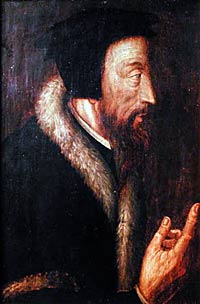Readings:
Psalm 119:1-8
Joel 2:1-2, 12-14
Romans 9:18-26
John 15:1-11Preface of Trinity Sunday
[Common of a Theologian and Educator]
[Common of a Pastor]
[Of the Holy Trinity]
PRAYER (traditional language)
Sovereign and holy God, who didst bring John Calvin from a study of legal systems to understand the godliness of thy divine laws as revealed in Scripture: Fill us with a like zeal to teach and preach thy Word, that the whole world may come to know thy Son Jesus Christ, the true Word and Wisdom; who with thee and the Holy Spirit livest and reignest, ever one God, in glory everlasting. Amen.
PRAYER (contemporary language)
Sovereign and holy God, you brought John Calvin from a study of legal systems to understand the godliness of your divine laws as revealed in Scripture: Fill us with a like zeal to teach and preach your Word, that the whole world may come to know your Son Jesus Christ, the true Word and Wisdom; who with you and the Holy Spirit lives and reigns, ever one God, in glory everlasting. Amen.
This commemoration appears in A Great Cloud of Witnesses
Return to Lectionary Home Page
Webmaster: Charles Wohlers
Last updated: 30 March 2019
JOHN CALVIN
THEOLOGIAN, 1564
 John Calvin (Jean Cauvin) was born at Noyon, France on 10 July 1509. At fourteen he was sent to Paris to study theology, and developed a particular interest in the writings of Augustine. He received his MA when 19. His father then insisted that he take up law instead, which he did for three years, returning to theology when his father died.
John Calvin (Jean Cauvin) was born at Noyon, France on 10 July 1509. At fourteen he was sent to Paris to study theology, and developed a particular interest in the writings of Augustine. He received his MA when 19. His father then insisted that he take up law instead, which he did for three years, returning to theology when his father died.
In about 1534, he underwent a sudden conversion and became an ardent Protestant. He went to Basel, a Protestant (Zwinglian) city in Switzerland, where he wrote and published the first edition of his Institutes of the Christian Religion, a work of systematic theology. Some philosophers are system-builders and some are not. Calvin was. Where others had been content to testify to their experience of God's grace, Calvin undertook a detailed logical account of grace. His detractors say that some things, like a good joke, or a living organism, are destroyed when you take them apart to see what makes them work. His admirers say that he faced the hard questions that others had preferred to evade. In his writings on predestination, he seems to portray God as arbitrarily withholding salvation from many. But it is well to remember that his doctrine is rooted in the experience of God's grace at work in his own heart, and an unwillingness to attribute its presence to anything but the mercy of God, a determination never to claim that he has done anything more or better than Judas Iscariot to deserve a better destiny.
In 1536, he became one of the preachers in the city of Geneva, in 1538 he was banished, and in 1541 returned in triumph, and established a form of church government that has been associated ever since with churches called Reformed or Presbyterian. It provided for a set of boards or consistories to maintain discipline in local congregations and in district-wide groups of congregations, boards consisting partly of clergy and partly of the elected representatives of the congregation.
Calvin's major achievements are (in the opinion of this non-Calvinist):
- The Institutes, which present an organized statement and defense of the Reformed theology. Even those who disagree with him benefit from having a well defined point of departure.
- His commentaries on the Scriptures.
- His system of Church government. (Most of the serious Calvinists I know, when asked to explain why they prefer their denomination to the alternatives, mention this system as one that greatly appeals to them.)
- His contributions to the dialogue on election, grace, free will, predestination, Divine sovereignty, etc.
Luther and Calvin were contemporaries and part of similar movements within the Church, but there were important differences between them. Calvinist churches differ from Lutheran ones on the mode of Christ's presence in the Lord's Supper; on the nature of the Sacraments (Calvinists come closer to regarding these as teaching ceremonies, although many Calvinists would disagree with that summary), and on style of worship. Some Calvinists (not all) have a tradition that forbids instrumental music in worship (even to keep the singers on key), and the use of any hymns except the Psalms. On questions of worship, the historic Lutheran policy (not always adhered to) has been that, if two possible policies are equally consistent with Holy Scripture, one ought to use the one more like that of Rome, so as not to be disputing for disputing's sake. The rule adopted by many Calvinists is to go for the policy less like that of Rome. The result is that you see a lot more stained glass in Lutheran churches than in Calvinist ones.
Calvin died 27 May 1564.